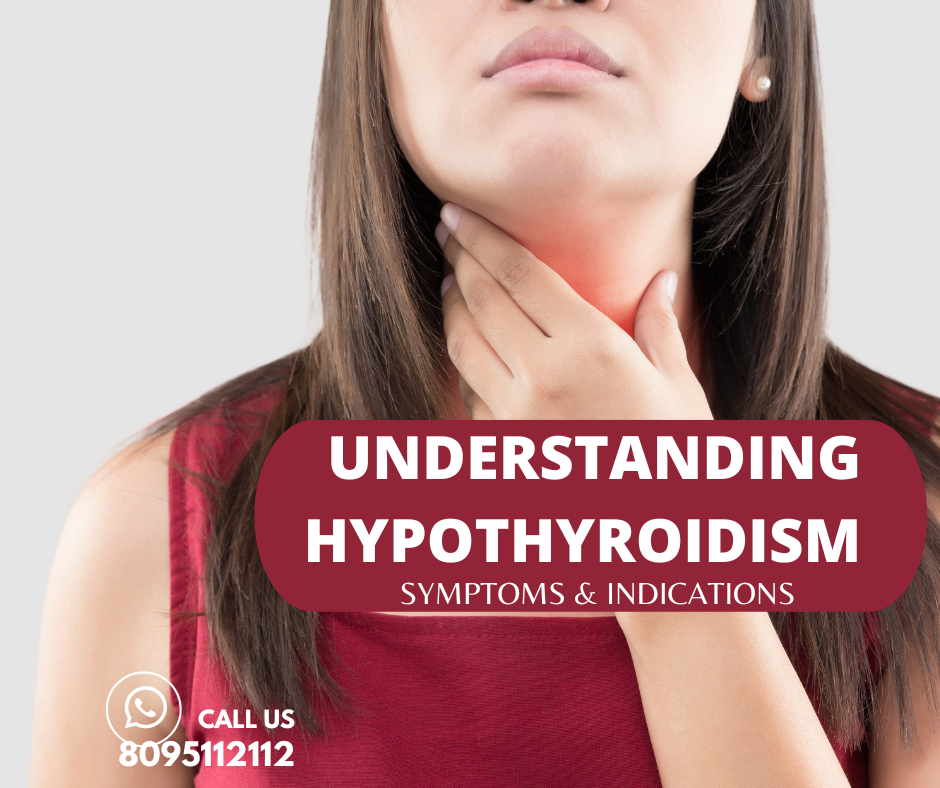
Understanding Hypothyroidism: Symptoms and Implications
Share

In hypothyroidism, the reduced levels of thyroid hormones can lead to a slowdown in metabolism, causing the body to burn calories at a slower rate. This decreased metabolic rate makes it more difficult for the body to utilize calories efficiently, leading to weight gain, even with normal or reduced caloric intake. Additionally, hypothyroidism can contribute to other factors that promote weight gain, such as fluid retention, increased appetite, and changes in fat distribution. Despite efforts to maintain a healthy diet and exercise regimen, individuals with hypothyroidism may find it challenging to manage their weight due to these metabolic changes.

Fatigue is also a very common symptom in hypothyroidism due to the impact of low thyroid hormone levels on various physiological processes in the body. In hypothyroidism, the diminished levels of thyroid hormones result in a slowed metabolic rate, leading to decreased energy production at the cellular level. This metabolic slowdown affects various bodily functions, including muscle contraction, nerve signaling, and overall physiological processes. As a result, individuals with hypothyroidism often experience feelings of persistent tiredness, weakness, and lethargy, despite adequate rest. Additionally, hypothyroidism can contribute to other factors that exacerbate fatigue, such as disrupted sleep patterns, mood changes, and muscle weakness.

Muscle Weakness and Joint Pain are common symptoms in thyroid disorders, particularly in hypothyroidism. These symptoms are often associated with the impact of low thyroid hormone levels on various physiological processes in the body. In hypothyroidism, the decreased levels of thyroid hormones can lead to disruptions in muscle metabolism, impairing the ability of muscles to contract efficiently. This can result in feelings of weakness, fatigue, and overall decreased muscle strength. Additionally, hypothyroidism may also affect joint health by contributing to inflammation, stiffness, and reduced lubrication within the joints. These changes can manifest as joint pain, stiffness, and decreased range of motion, making movements uncomfortable and difficult.

Dry skin/hair These thyroid hormones play a crucial role in maintaining the health and function of the skin and hair. One of the key mechanisms through which hypothyroidism contributes to dry skin and hair is by reducing sebum production. Sebum, an oily substance produced by the sebaceous glands in the skin, plays a crucial role in maintaining skin and hair hydration. Thyroid hormones, particularly triiodothyronine (T3) and thyroxine (T4), influence the activity of these sebaceous glands. In hypothyroidism, the decreased production of thyroid hormones leads to a decline in sebum production. As a result, the skin's natural moisturizing and protective barrier is compromised, making it more susceptible to dryness. This reduction in sebum also affects the hair, as the lack of adequate oil on the scalp and hair strands contributes to dryness, brittleness, and an overall lack of luster. The impact of hypothyroidism on sebum production underscores the importance of thyroid hormones in maintaining the health and vitality of both skin and hair.

Gastrointestinal system Hypothyroidism, characterized by an insufficient production of thyroid hormones, can have pronounced effects on various bodily functions, including the increased likelihood of constipation. Thyroid hormones play a crucial role in regulating the metabolic rate and the overall function of the digestive tract. In hypothyroidism, the slowed metabolism can result in reduced intestinal motility, leading to a sluggish movement of stool through the digestive system. This delay in transit time, combined with decreased secretion of digestive fluids, can contribute to constipation. Additionally, hypothyroidism may affect the muscles in the digestive tract, making them less efficient in propelling stool forward. Addressing the underlying thyroid dysfunction through proper supplement is the key to restoring normal thyroid hormone levels, which in turn, can help alleviate constipation and improve overall gastrointestinal function.
Depression is a common symptom associated with thyroid disorders, particularly in the context of hypothyroidism.The relationship between thyroid function and mental health is intricate, and disruptions in thyroid hormone levels can significantly impact mood regulation. In hypothyroidism, where the thyroid gland produces insufficient amounts of triiodothyronine (T3) and thyroxine (T4), various physiological and neurochemical changes occur. Thyroid hormones play a role in neurotransmitter synthesis and regulation, including serotonin, which is crucial for mood stabilization. The deficiency of thyroid hormones may lead to alterations in neurotransmitter levels and receptor sensitivity, contributing to depressive symptoms. Moreover, hypothyroidism is associated with general fatigue, cognitive impairment, and a slowed metabolism, all of which can exacerbate feelings of sadness and despair. Proper diagnosis and management of thyroid disorders, often involving thyroid hormone replacement therapy, are essential not only for addressing the physical symptoms but also for improving overall mental well-being and mitigating depressive tendencies.



Conclusion,

